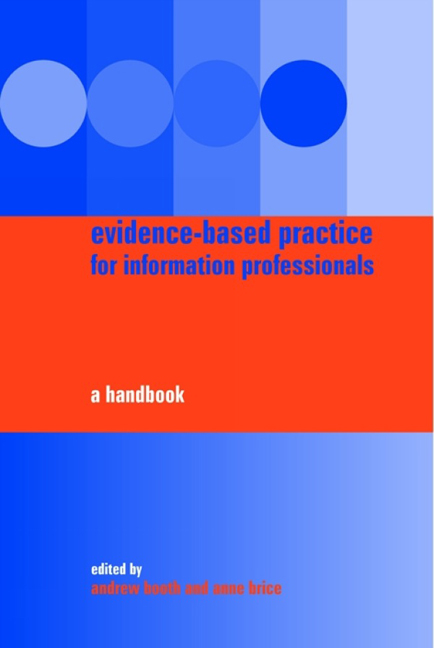Book contents
- Frontmatter
- Contents
- Foreword
- Editors and contributors
- Part 1 The context for evidence-based information practice
- 1 Why evidence-based information practice?
- 2 A brief history of evidence-based practice
- 3 Evidence-based information practice: a prehistory
- 4 How good is the evidence base?
- 5 Why don't librarians use research?
- Part 2 Skills and resources for evidence-based information practice
- Part 3 Using the evidence base in practice
- Index
4 - How good is the evidence base?
from Part 1 - The context for evidence-based information practice
Published online by Cambridge University Press: 08 June 2018
- Frontmatter
- Contents
- Foreword
- Editors and contributors
- Part 1 The context for evidence-based information practice
- 1 Why evidence-based information practice?
- 2 A brief history of evidence-based practice
- 3 Evidence-based information practice: a prehistory
- 4 How good is the evidence base?
- 5 Why don't librarians use research?
- Part 2 Skills and resources for evidence-based information practice
- Part 3 Using the evidence base in practice
- Index
Summary
Introduction
Identifying research evidence relevant to answering EBIP questions poses an initial challenge. How good is the evidence base? How well does it answer our EBIP questions? Once we have identified and obtained this research then we have to evaluate its relevance and quality, a second major challenge (Chapter 9).
This chapter identifies the types of research that may be used to answer important questions for our practice and outlines how an understanding of research types helps in matching an appropriate research type to a specific question. The chapter ends with an appraisal of the overall evidence base.
Identifying the evidence base
The evidence base for information practice is located within three main search domains: (1) the library and informatics literature; (2) the so-called ‘grey literature’ for our field; and, (3) the literatures outside our field with functional relevance to the question such as the literatures of the social, behavioural, education or management sciences.
The library and informatics literature
Issues of index coverage
The first of these, the library and informatics literature, poses several unexpected challenges for the searcher. To illustrate from within the health sector, the major journals in our field include Health Information and Libraries Journal, Journal of the Medical Library Association and Medical Reference Services Quarterly. Less prominent journals include Bibliotheca Medica Canadiana; Hypothesis and Journal of Hospital Libraries. While PubMed is available to all searchers, commercial databases are likely to be too expensive for some professionals to access. The databases selected in any search for the contents of the major journals will yield different retrieval. Tables 4.1–4.3 illustrate uneven coverage amongst three databases. From Table 4.1 one notes that PubMed appeared to offer the most complete access, for the years 2001 or 2002, to the contents of Journal of the Medical Library Association (JMLA): (51 [2001] and 66 [2002] references compared to the Library Literature database's 32 and 42 respectively). For 1998, however, Library Literature provided access to 93 versus PubMed's 74 references to the same journal. Within the field, Library Literature is used extensively when searching for the evidence needed to make decisions. Yet, for the years 1998–2002, Library Literature did not index any contents for Health Information and Libraries Journal or its predecessor Health Libraries Review.
- Type
- Chapter
- Information
- Evidence-based Practice for Information ProfessionalsA Handbook, pp. 36 - 48Publisher: FacetPrint publication year: 2004
- 5
- Cited by



